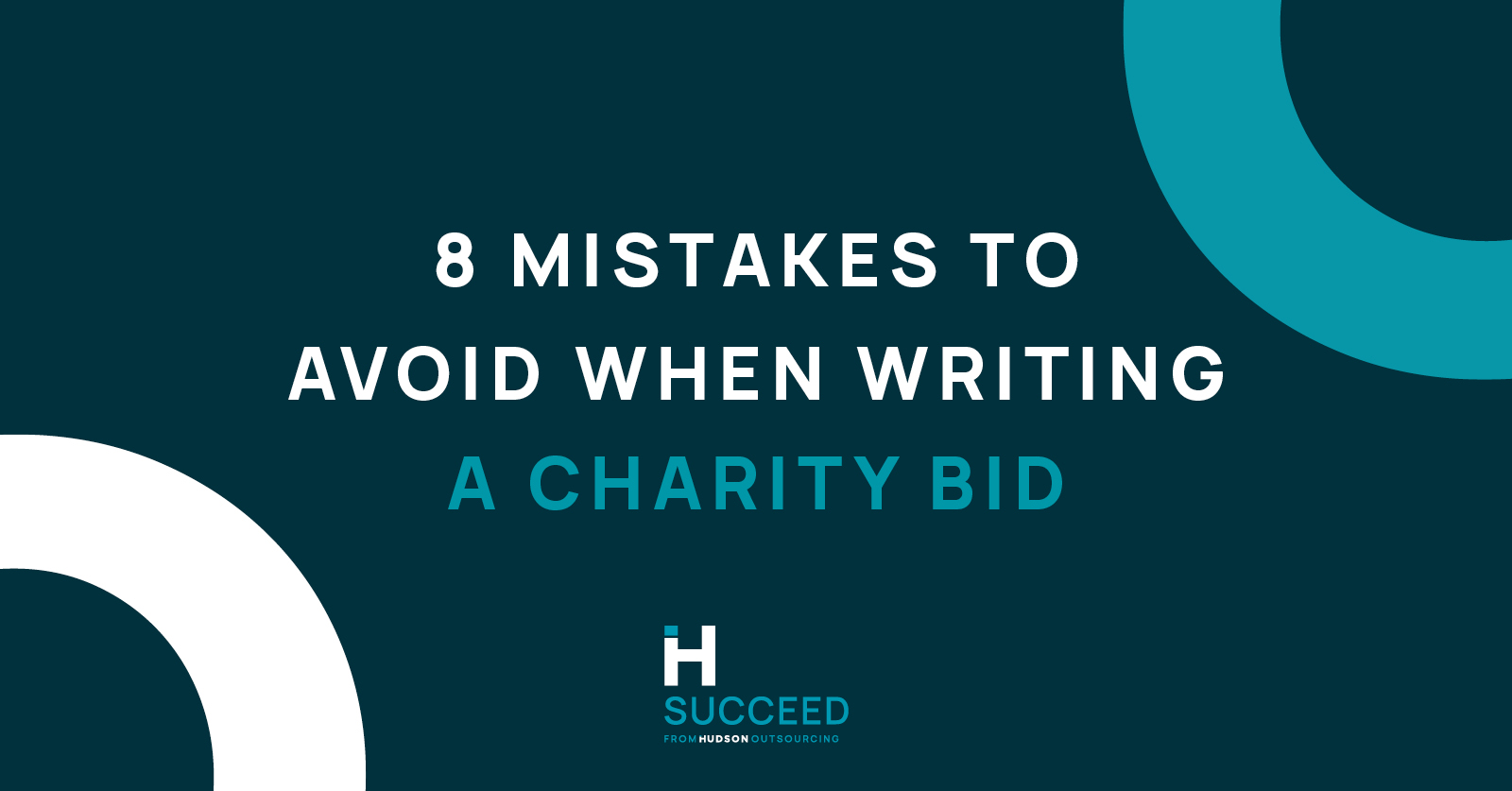Charity bid writing: 8 mistakes to avoid
[Last modified: July 2021]
Charity bid writing can be overwhelming at the best of times. Opportunities may come around a few times a year, so it’s best to be prepared to writing bids. You want to allow plenty of time to create a winning charity bid. It can be easier said than done if you’ve never done charity bid writing before.
Ultimately, you want your bid to outshine your competitors and persuade the funder’s that you’re the best for the job. Below are eight tips on what not to do when charity bid writing.
-
Don’t make your project meet a funder’s needs
When writing a charity bid response, all too often applicants try and make their project meet a funder’s needs. Organisations that are trying to wedge their project to fit a funder’s priorities have less chance of being successful.
However, it should really be the other way around. You should be looking for a funding opportunity that aligns with the needs of your project. If you try to accommodate your project, you may not be able to achieve your desired outcomes. Be that either in meeting a need or securing appropriate funding.
-
Don’t forget to read the funding guidelines before you apply
One thing not to do when charity bid writing is apply for an opportunity without reading all the funding guidelines. Each funder will require something different and have different needs and pre-requisites that should be met. There may be a certain qualification that you need on page 30 that you don’t see. You don’t want to waste time and resources writing a response if you aren’t eligible to apply.
-
Avoid rambling incoherent applications that have no substantial evidence of a need
Funders want those applying for funding to have substantial evidence of a need for a project. There’s no point developing a way to tackle an issue just because you think it’s the right thing to do. Funders will see right through this and unthought out projects won’t get very far.
Moreover, if your response is rambling and unclear, a funder will be less likely to award you the funding. Your response should be clear, concise and compelling. You should be persuasive when charity bid writing. You want to convince the funder that you need their funding and that it will be well spent.
-
Don’t submit your application in the wrong format
Before submitting your response, be sure to check the formatting requirements. This is an obvious error that can be easily avoided. Making a checklist of important dates and information can help prevent this from happening. This checklist could include, but shouldn’t be limited to, the following:
-
Don’t ask for an unreasonable amount of funding
Many funders want you to be as honest and realistic as possible regarding how much everything is going to cost. If you ask for too little you won’t be able to complete the project, defeating the purpose. Funders want to see a positive change from the money they’re giving your business. You should take this into account when charity bid writing.
Funders want to know how every penny is going to be spent. It’s common for them to check how the money is being spent either during the project or once it’s finished. They will want to see that their money is making positive changes. They will be expecting to see the best value for money and that their funding is providing long-term solutions.
The costs the funder will cover should be outlined in the specification. Some will only pay for Capital Costs, some will only pay Core Costs, and some may only pay for salaries. You should avoid being unnecessarily flashy. For example, don’t ask for the money for a MacBook Air when any other brand or cheaper laptop will suffice.
-
Never assume that the funder already knows about you
When tendering for contracts, it’s important that you don’t assume the funder knows anything about your business. It’s common for a commissioner to have no knowledge of what your organisation does.
You should explain who your organisation is, what it does and why it needs the funding. Leaving room for assumptions allows for the wrong assumptions to be made. This could end up hindering your bid when it could have been avoided in the first place.
-
Don’t write too little or too much
Word or page counts are given for a reason. When charity bid writing, you want to avoid writing too little or too much. If a funder thinks a question deserves a 500-word response, simply writing a couple of sentences response won’t suffice. Your bid will likely suffer as a result, so it’s best to try and match the word or page counts where possible.
-
Never submit it late
One of the most common mistakes made by organisations is thinking that they can submit their bid late. A response will not be accepted even if it’s submitted one minute late. If you aren’t able to meet a submission deadline, a funder may think that it’s slightly unprofessional. They may not think that you are able to then carry out the project or trust you with their money. Great time management is a must when charity bid writing.
Need help with charity bid writing?
It’s worth knowing the tendering process is long and complex. If you don’t have the experience, resources or time to submit a winning charity bid in-house – we can help with writing bids.
Here at Hudson Succeed, our dedicated team have over 60 years of collective bid writing experience. We boast an 87% success rate have secured direct contract wins totalling over £300million for our clients. We offer four bid writing support services.
Tender Writing
Once you’ve found the perfect charity bid, why not send it over to us? Our Bid Writers will let you know what they need from you and provide you with a full Tender Writing breakdown. They’ll take care of it all for you and even submit it on your behalf.
Tender Mentor
If you’ve written your own tender response and need someone to double-check it for errors, Tender Mentor can help. Our Bid Team will proofread your bid for any inconsistencies, spelling or grammar mistakes. They’ll also ensure that it’s in line with the specification before you submit.
Tender Ready
Our Tender Ready programme is perfect for those who have never tendered before. A Bid Writer will work with you to make sure you have everything you need in place to tender successfully. The 4-week programme offers your business:
- A 12-month subscription to a Discover portal for your choice
- Access to Global Bid Directors and Senior Bidding professionals
- An Organisation-wide Bid Library, including 3 case studies, 5 CV’s and 8 policies
- Additional flexible benefit options.
Tender Improvement
If you’ve been charity bid writing but aren’t seeing the results you want, our Tender Improvement package can help. Our Bid Team will assess your previous responses and supporting documents, working with you to improve for future submissions.
How can I find charity bid writing opportunities?
Charity bid writing opportunities can arise in any business sector. Keeping tabs on the right opportunity for your company can turn into a bit of a headache. There are thousands of sites across the UK posting bid opportunities. Ideally, you’d want one centralised, industry-specific portal that hosts these leads and opportunities.
At Hudson Discover, we house 11 sector-specific tendering portals. These consist of:
A subscription to one of our industry-specific portals will include:
- Unlimited portal access. You can browse your industries portal to your heart’s content. See the hundreds of opportunities that are available, intuitively categorised and easily accessible. You’ll have access to all exclusive, public and private tendering opportunities in one place.
- A daily email bulletin. Receive email alerts when new tenders are uploaded, straight to your inbox.
- Filter results. There’s no reliance on inaccurate CPV codes. You are able to filter and search results by keyword, location budget and more. This allows you to find the perfect opportunity for your business.
- A dedicated Account Manager. They’ll handle any questions or queries you may have about the portal or charity bid writing.
- A free 20-minutes phone consultation with a Bid Writer. Our expert bid consultants will chat with you for 20-minutes about anything tender-related. They can recommend all the tender searching options that are available to you.
Upgrade to our new time-saving tools
Discover Elite can help optimise your tendering efforts, even when you’re busy. Our two new time-saving tools can improve your competitor awareness and success rate.
The Ultimate Time Save package offers your business:
- A maximum of five tender breakdowns per month.
- An annual subscription to a maximum of two Hudson Discover sector-specific portals. This option can help businesses that overlap two industries such as Hospitality and Facilities, for example.
- Pre-market and award engagement notices monitored on your behalf.
- Buyer portal management, including registration, password management, downloading documents and assessing viability based on your bid or no-bid
- Weekly phone calls with your Account Manager to discuss viable charity bid writing
The Become a Pre-Bid Master package also includes:
- All of the above.
- Up to seven tender breakdowns per month.
- A Bid Strategy delivered by a Senior Bid Manager with a minimum of 5 years of experience. It will also be managed by our Global Bid Director.
Contact us to find out how we can help your business grow.
Find funding opportunities with Discover Grants
Discover Grants can help you find and write your next funding application. Get in touch for more information.
Find more helpful tips and advice in our blogs. We cover topics including:





